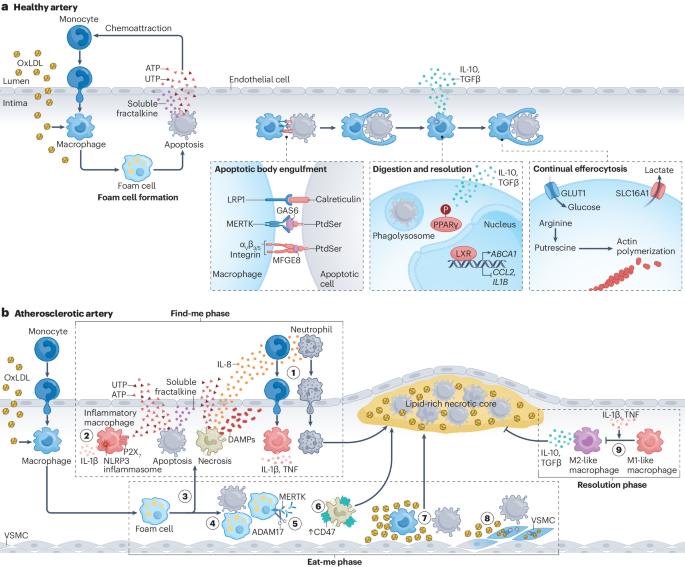Efferocytosis in atherosclerosis
IF 41.7
1区 医学
Q1 CARDIAC & CARDIOVASCULAR SYSTEMS
引用次数: 0
Abstract
Cardiovascular disease is the leading cause of death worldwide, and it commonly results from atherosclerotic plaque progression. One of the increasingly recognized drivers of atherosclerosis is dysfunctional efferocytosis, a homeostatic mechanism responsible for the clearance of dead cells and the resolution of inflammation. In atherosclerosis, the capacity of phagocytes to participate in efferocytosis is hampered, leading to the accumulation of apoptotic and necrotic tissue within the plaque, which results in enlargement of the necrotic core, increased luminal stenosis and plaque inflammation, and predisposition to plaque rupture or erosion. In this Review, we describe the different forms of programmed cell death that can occur in the atherosclerotic plaque and highlight the efferocytic machinery that is normally implicated in cardiovascular physiology. We then discuss the mechanisms by which efferocytosis fails in atherosclerosis and other cardiovascular and cardiometabolic diseases, including myocardial infarction and diabetes mellitus, and discuss therapeutic approaches that might reverse this pathological process. In this Review, Adkar and Leeper describe the mechanisms of programmed cell death and efferocytosis, discuss how efferocytosis becomes impaired in atherosclerosis and other cardiometabolic diseases, and suggest potential strategies to target these pathways for the treatment of atherosclerotic cardiovascular disease.


动脉粥样硬化中的吞噬作用
心血管疾病是导致全球死亡的主要原因,它通常是由动脉粥样硬化斑块进展引起的。越来越多的人认识到,动脉粥样硬化的驱动因素之一是排泄功能障碍,这是一种负责清除死亡细胞和消除炎症的平衡机制。在动脉粥样硬化中,吞噬细胞参与清除的能力受到阻碍,导致凋亡和坏死组织在斑块内积聚,从而导致坏死核心扩大、管腔狭窄和斑块炎症加重,并易导致斑块破裂或侵蚀。在这篇综述中,我们将描述动脉粥样硬化斑块中可能出现的不同形式的程序性细胞死亡,并重点介绍通常与心血管生理学有关的流出细胞机制。然后,我们讨论了在动脉粥样硬化和其他心血管及心脏代谢疾病(包括心肌梗塞和糖尿病)中,流出细胞功能失效的机制,并讨论了可能逆转这一病理过程的治疗方法。
本文章由计算机程序翻译,如有差异,请以英文原文为准。
求助全文
约1分钟内获得全文
求助全文
来源期刊

Nature Reviews Cardiology
医学-心血管系统
CiteScore
53.10
自引率
0.60%
发文量
143
审稿时长
6-12 weeks
期刊介绍:
Nature Reviews Cardiology aims to be the go-to source for reviews and commentaries in the scientific and clinical communities it serves. Focused on providing authoritative and accessible articles enriched with clear figures and tables, the journal strives to offer unparalleled service to authors, referees, and readers, maximizing the usefulness and impact of each publication. It covers a broad range of content types, including Research Highlights, Comments, News & Views, Reviews, Consensus Statements, and Perspectives, catering to practising cardiologists and cardiovascular research scientists. Authored by renowned clinicians, academics, and researchers, the content targets readers in the biological and medical sciences, ensuring accessibility across various disciplines. In-depth Reviews offer up-to-date information, while Consensus Statements provide evidence-based recommendations. Perspectives and News & Views present topical discussions and opinions, and the Research Highlights section filters primary research from cardiovascular and general medical journals. As part of the Nature Reviews portfolio, Nature Reviews Cardiology maintains high standards and a wide reach.
 求助内容:
求助内容: 应助结果提醒方式:
应助结果提醒方式:


